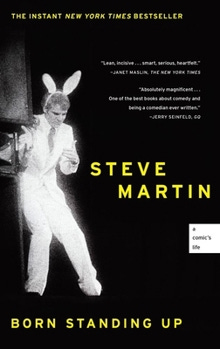Comedy Is Not Pretty
I’m currently reading five different books. One I am confident I will not pick up to continue, just as well not mentioned. Three are more inviting (Hobsbawm’s The Age of Revolution, Kolakowski’s Main Currents of Marxism, and V. 1 of Capital). The fifth has just pulled me in completely — Steve Martin’s “Born Standing Up.” He describes it as more of a biography of somebody else, a person he no longer is. It covers his rise to fame as a comedian, rather than what came after.
My interest is magnified since we had vaguely similar upbringings in similar time periods. He is four years older. His family probably had less income than mine, but it was never down and out. Nor were we. Like him, I had a youthful interest in magic. Martin evidently became a skillful manipulator of cards and coins, something at which I made token efforts but never succeeded in mastering. I wasn’t industrious or patient enough. I did accumulate a trunkful of tricks that sadly disappeared from my parents’ home later on. As a performer I was a complete bust. After one performance at summer camp, a friend described my demeanor as “forlorn.” That was just me being myself, usually interpreted by others as defeatist. Show business was never going to be for me, in any event. I was an A-student in high school, destined for scholarly accomplishment.
I caught an excerpt of Martin’s book in The New Yorker, purely by chance, and I was immediately absorbed and ordered it. He is a surprisingly good writer, surprising since I hadn’t thought of him in that way. Years ago I read a very short bit by him called “The Cruel Shoes.” It was amusing enough, but more of a gag than a spur to read more. I have now ripped through the new book in two sittings.
I still remember, many decades ago, when I first saw him on TV. I was watching with my dorm roommate, with whom I’ve stayed in contact ever since. My recollection is of him in a preppy sweater with a short haircut (by the standards of the time). He began by throwing his arms out and exclaiming “Joe College!” It was like a goof on frat boys, whom we disliked. My roommate and I exchanged glances, knowing this would be up our alley.
Martin was part of a generational tide of hip comedians, including Richard Pryor, George Carlin, Mort Sahl, the Smothers Brothers, and Andy Kaufman. These guys weren’t doing “How’s your wife?” jokes. (I happen to like those too.) It reached its apotheosis with Saturday Night Live, which was made for Martin’s schtick.
I have the idea that some people are just naturally funny. Instead, maybe laborious practice is the key to their effectiveness as performers, to make what you do look spontaneous and unforced. Some comedians are candid about working tirelessly over their lines and gestures, honing them in minute ways for impact. Martin too is quite explicit that he approached his job as an almost scholarly exercise, like training to be an engineer. He seems to have been interested in nothing else except girls and his college philosophy courses. Later he became a serious art collector.
The cover of the book for me evokes Martin’s intense preoccupation with the minutia of his performance. He seems to be straining, deep in concentration, even with the ridiculous bunny ears and white suit.
Martin’s painstaking rise transpired while the campus revolution, hippies, and the peace movement were all blowing up. Martin was exposed to some very serious California lefties, in the persons of Dalton Trumbo’s family and friends. But his political commitments or sympathies are barely visible, even though he participated in demonstrations and worked as a writer on the ill-fated Smothers Brothers TV show. His apparent indifference to politics in the 60s and 70s makes me wonder if I was the odd one, since I’ve been obsessed with politics for my entire life. (Not so much any longer.)
I’ve seen few of his movies. The premises looked stupid. The one I remember best is Three Amigos, and I remember that mostly because of Chevy Chase and Martin Short. My favorite Martin is the one of stand-up and Saturday Night Live, a life he left behind around 1980, though there was his epic slot in Little Shop of Horrors. I do enjoy his new show, “Only Murders In the Building” with Short and Selena Gomez, streaming on Hulu. Again, it’s mostly a showcase for Short, who can always make me laugh.
One might be encouraged to think of the life of a rising performer as a kind of lark. Sex, drugs, and rock & roll. In fact it’s extraordinarily exhausting, and the drugs can kill you. Martin was determined to steer clear of the latter, since he felt it impaired his performance.
I’m reminded of a book I read a year or so ago by an artist similarly absorbed in the sheer work of creation and the tedium of self-promotion. I’m so addled now that I can’t remember who it was. Ishmael Reed, maybe? Fame takes more than talent. It’s really hard work, and the price is high.


"Forlorn," ha! You could have turned THAT into schtick.